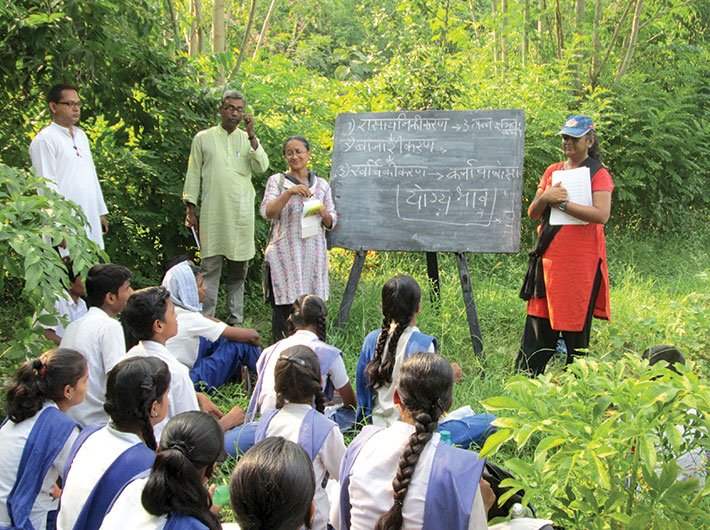Alternative schooling in India has caught momentum as many are adopting teaching methods proposed by Gandhi, Krishnamurti and Tagore. There are challenges, but educationists are hopeful
Mahatma Gandhi’s philosophy of education, ‘Nai Talim’ or ‘Basic Education for All’, was conceptualised in 1937 and is just a year away from completing 80 years. He believed that knowledge and work are not separate.
“Craft, art, health and education should all be integrated into one scheme. Nai Talim is a beautiful blend of all the four and covers the whole education of the individual...” The thought is still alive in combination with kindred approaches espoused by Rabindranath Tagore and J Krishnamurti.
Gandhi’s model uses work as a medium of instruction while using language only as a medium of communication. Tagore on the other hand wanted activities engaging all the senses as well as proximity to nature for a complete education. Krishnamurti believed in the power of observation as a way to discovery by the child. Nature and hands-on activities are tools in this approach.
In July, Maverick Teachers Global Summit was organised by education NGO Agastya International Foundation in Chittoor district of Andhra Pradesh. It showcased some of the educationists of today who are swimming against the tide to keep education joyful and stress-free. The Krishnamurti schools and their sister institutions have been staying away from the beaten track of our education system and holding the alternative schooling banner alive. However, educationists feel there is too much stress on such institutions.
Sushama Sharma of Anand Niketan School says, “Being innovative and creative is not easy. We have multiple pressures as we have to complete the syllabus for examinations given by boards meant for mainstream schools. I feel there should be a Nai Talim Board for all alternative schools so that more such schools are motivated,” she says. “In fact the national council of rural institutes under the ministry of human resource development was meant to address such issues,’’ says Sharma, adding that states should also be taking steps to promote alternative school boards. She also says that the Gujarat government earlier funded 200 Nai Talim schools. Today the number has come down to 50.
Sunanda Ali, principal of The Peepal Grove School, feels that having a board for alternative schools would help but schools have to first agree on what is ‘alternative’. “A Nai Talim Board would insist on following Nai Talim which may not be acceptable to all alternative schools,’’ she adds.
Puvidham Centre for Learning
Meenakshi Puvidham has fine-tuned her method – learning through experience and life – combining ideas of Gandhi, Tagore and her own learnings. She started the Puvidham centre for learning, a primary school in rural Tamil Nadu near Dharmapuri district that caters to local children. The school which started with three children in 2,000 has 90 children today. The curriculum at her school includes farming and cattle rearing which are considered as part of the student’s natural living milieu. One sees children paint all over the walls of the school, being guided by their art teacher. They ply the charkha, and work in their paddy patches, besides drawing and painting things they see around them. This way they learn to observe. Spinning, weaving, carpentry, hand-made paper making, terracotta, origami, cooking and using computers are the other activities through which learning is achieved in this school. They also make manure and soap and recycle every bit of paper they use.
Gandhi conceived his theory of Nai Talim on the basis of his own experiments with pedagogy which he practised while bringing up his sons at the Tolstoy farm in South Africa. They worked with the residents of the farm, in the kitchen, in the cowshed and had a couple of periods in the afternoons where they studied history, geography and languages mainly through stories. This model is the basis for Puvidham to a great extent. “Mostly we respond to the need on campus for creating opportunities for meaningful work. We make them active solution seekers in society. The society that we see today is a reflection of the education we are giving in schools,” says Puvidham. “The society is competitive to the point of being callous, uncaring and selfish. It is a reflection of our classrooms where the teacher is an image of apathy; insensitive to the individual needs of the child as she tries to constantly keep the whole class ‘occupied’,” she adds.
Arvind Gupta
There are many schools which do not opt for a totally work based learning system and use methods that help children learn through discovery. Some educationists have been providing resources to enable such schools. Arvind Gupta is an engineer who left his job to dedicate his life to making educational toys and popularise science and has been making learning a joyful experience. He is on his toes to visit schools across the country with his science toys. He sees hope amidst the general tendency of making education just an input for a rat race. “Over the last 30 years I have seen a shift in schools. The project method is the ‘in’ thing. In a few schools, children are learning through experiments,’’ he says. He sees hope in the Atal Tinkering Laboratories initiative of the government which will fund '10 lakh each to 500 schools to set up labs. “The government has realised that there cannot be any ‘Make in India’ unless children start dirtying their hands by doing simple experiments and making working models in schools,’’ he adds.
Foundation for Contemplation of Nature
Ajay Rastogi is trying to bring nature and life into the parched lives of the modern day students through his Foundation for Contemplation of Nature in Ranikhet, Uttarakhand. “Our foundation is concerned with bringing mindfulness in students and teachers,” says Rastogi. He provides fortnightly courses for school children and teachers so that they can engage in daily activities at home and thus understand rural life while getting close to nature.
The Peepal Grove School
Arvind Dhondphale, an art teacher from The Peepal Grove School, an alternate school in Chittoor district in Andhra Pradesh, believes in turning art into a journey of introspection. “One of the activities I have been regularly doing with students is to make them find stories and create art from their surroundings. They use bricks, plants, soil or even trash to tell stories. This helps creativity and imagination. Talking about their work in the end helps their oratory skills,” he says.
The school, which is a decade old, has only 120 students and does not conduct examinations till eighth standard. It encourages sports, yoga, kalari (a martial art), music, dance and art as much as other subjects up to class 12 to ensure a holistic and stress-free education.
Anand Niketan School
Another school which is keeping the Gandhian method of education alive is Anand Niketan School situated in Sevagram, Wardha, in Maharashtra. The school was closed in 1974 but was revived in 2005. It is now a living model of Nai Talim. Sushama Sharma, principal, says, “It is observed that agriculture was the best activity to learn how to observe and to keep children close to nature.” She has included spinning, stitching, art, and cooking to the curriculum. “Cooking can be a medium to learn about health, while the science of spinning is a good tool to learn physics and mathematics,” she adds. A typical week in the life of a seventh grade student at Anand Niketan includes two classes for agriculture. If it is the time of sowing and weeding, then there are continuous classes, she explains.
Menon is a freelance journalist who also teaches at The Peepal Grove School.
(The article appears in the October 1-15, 2016 issue)

